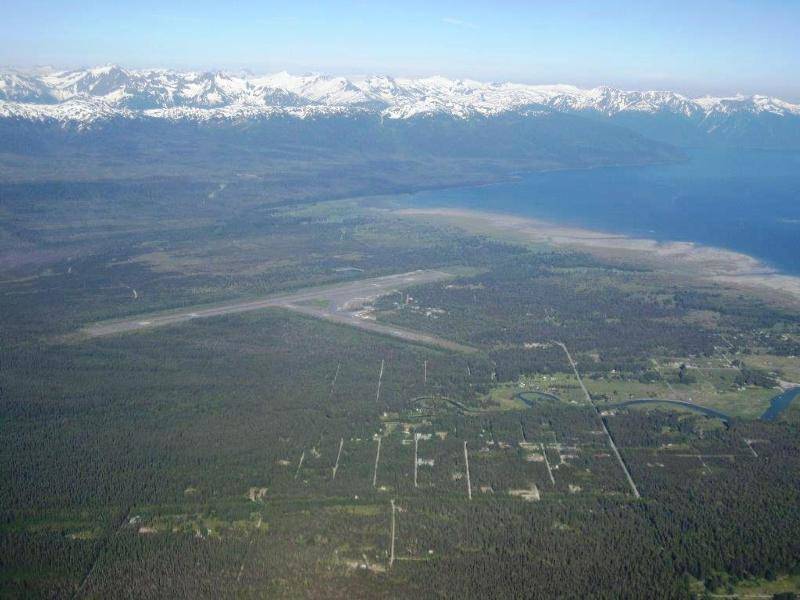Some residents of the small town of Gustavus, near Glacier Bay National Park, are relying on state-provided drinking water after testing of private wells showed high levels of a toxin used in fire-fighting foam.
The toxin — a group of chemicals known as PFAS — has been detected in levels roughly equal to three drops in an Olympic-sized swimming pool, according to Department of Transportation and Public Facilities spokeswoman Aurah Landau. But the concentration rises above safety levels set by the state Department of Environmental Conservation.
Officials are being cautious because health effects are not well-studied. Science on the group of compounds is “rapidly advancing,” Landau said, and PFAS contamination has become a national issue. DOT&PF has provided affected Gustavus residents with safe drinking water in the form of bottled water.
The toxin has also been detected at the Fairbanks International Airport, the City of Fairbanks Regional Fire Training Center, Eielson Air Force Base and Moose Creek, according to DOT&PF.
“DOT&PF statewide is looking at this very seriously and working to handle it in as responsible a way as possible,” Landau said.
Public officials believe the contamination sources from the Gustavus Airport, where aircraft rescue crews used fire-fighting foam containing PFAS. Manufacturing companies have phased out the use of the chemicals in foams used to contain jet-fuel fires since about 2001, Landau said, but it remains on a list of Federal Aviation Administration-approved foams.
Fire crews used the foam annually to test firefighting equipment, Landau said, as recently as this summer.
DEC officials first reported the contamination in late July. Initial testing found high levels of PFAS in several sources on airport grounds, prompting the airport to shut off water service, Landau said. DOT&PF then hired an environmental consultant to test nearby wells.
A second round of sampling identified 11 sources with high PFAS levels. A third round of testing, released Monday, showed at least 21 water sources had high PFAS levels, Landau said. Eighteen of those sources are wells: one at the airport, six used for gardening and washing and 11 for private homes and businesses. Eight well owners are receiving bottled water, Landau said, while the owners of three contaminated wells are out of town.
A water source supplying Gustavus’ school and National Park Service facilities was shown to have PFAS levels below DEC’s safety threshold, Landau said.
“The scope of work on this so far has been, we want to find out immediately who needs alternative drinking water and provide that water,” Landau said.
DOT&PF is now exploring options for providing a long-term alternative water source, Landau said.
DEC’s Danielle Duncan said PFAS regulations over have gone through several recent changes. The EPA set a new advisory level in 2016 of 70 parts per trillion for the combination of two PFAS chemicals, Duncan said.
DEC has since proposed a more conservative action level of 70 parts per trillion for five PFAS chemicals.
“The DEC actually went stricter than that,” Duncan said.
The change is currently up for public comment.
It’s not known how long some residents will depend on state-provided water. PFAS does not break down quickly and can accumulate over time, according to the Environmental Protection Agency.
Kristin Bridges, Ph.D., a public health specialist with the Department of Health and Social Services, explained that PFAS compounds are an “emerging contaminant,” a term used to describe chemicals whose health affects have not been extensively studied, but are believed to be harmful.
Large scale studies have been done on a population exposed to PFAS in the Ohio River Valley over a long period of time, Bridges said, and on some animals in laboratory settings. The work has shown that the toxin can affect several human body systems, but scientists have not yet established a level of PFAS in the blood associated with these effects, Bridges stressed.
PFAS has been associated with a range of health outcomes, including an increase risk of ulcerative colitis, liver damage, an association with abnormal fat metabolism and high cholesterol, Bridges said. Chronic kidney disease, kidney cancer, complications with pregnancy, reduced vaccine responses and hormonal changes, among other things, have also been linked to the compounds Bridges said.
“Day after day we find new studies that come out that find new things,” Bridges said. “The phrasing here is that there’s sufficient evidence to show a probable link of exposure to some type of PFAS to these effects. The scientific weight is there, but you have to consider how complex a study involving humans can be.”
DHSS is not testing individuals in Gustavus for levels of exposure, Bridges said. Blood testing wouldn’t help a health care provider as it’s not known what levels of PFAS in the blood are associated with what risks, Bridges said. There’s also no known method of extracting the chemical from the body, she said, so the only treatment is to flush the chemical from the body.
Commercial airports may soon be exempt from military specifications which mandate the use of PFAS firefighting foams. A bill just passed through the U.S. House of Representatives that includes the exemption.
Gustavus will hold a community meeting on the contamination on Oct. 30 at the Gustavus School.
• Contact reporter Kevin Gullufsen at 523-2228 and kgullufsen@juneauempire.com. Follow him on Twitter at @KevinGullufsen.

